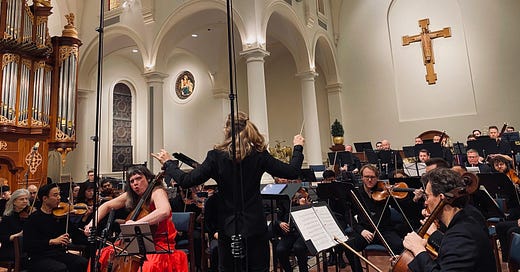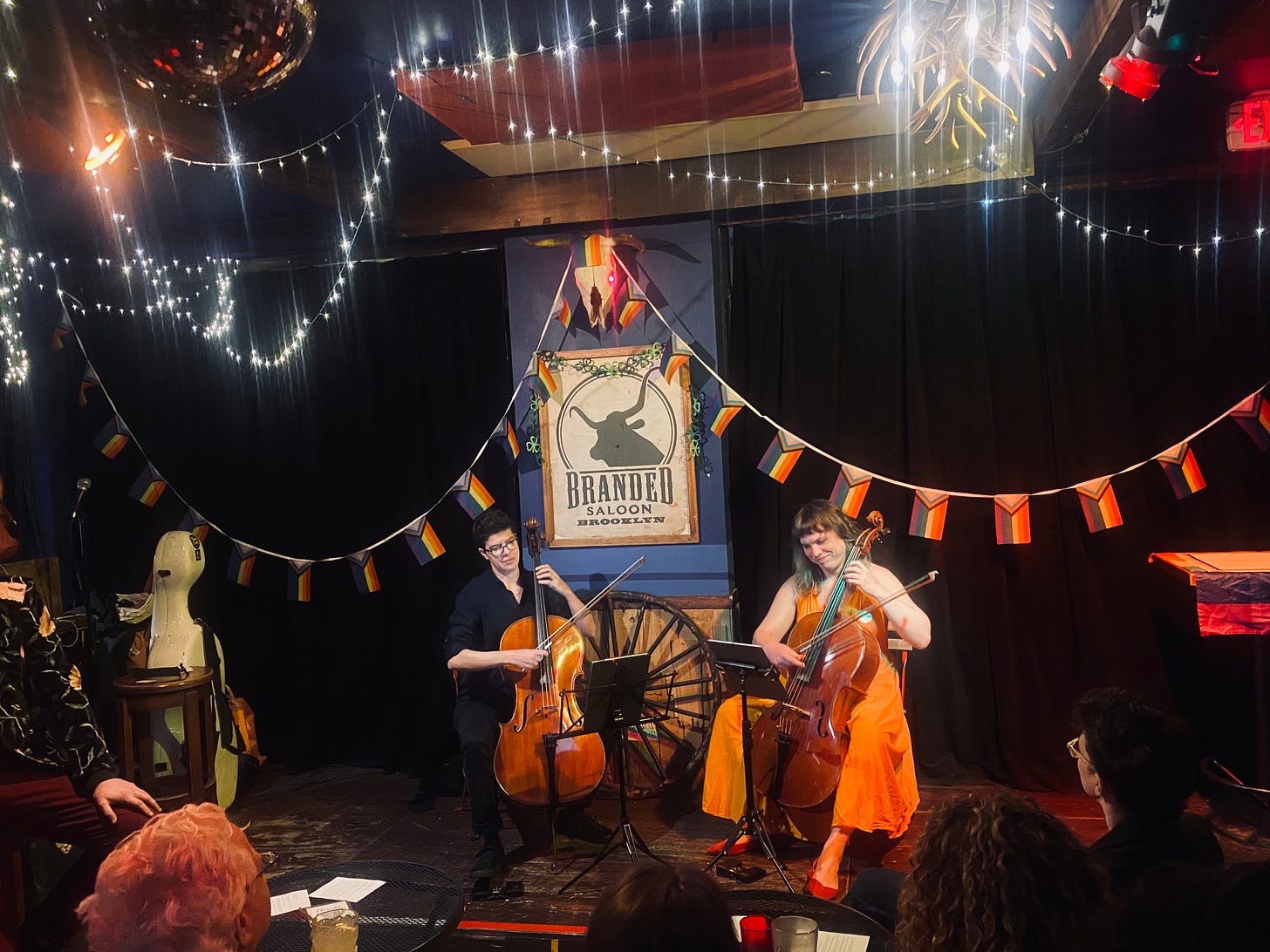Gorg
The Church of the Holy Apostles was stuffed to the rafters — on Saturday, March 16 — for a performance by the Queer Urban Orchestra. This sold-out concert explored the (rather unrelated) themes of “chosen family” and “nature.”
And though the starting Copland overture was a bit stiff, the community orchestra rose to the occasion, under David Bloom’s baton, for the East-coast premiere of Andrew Yee’s Briefly Gorgeous, based on a novel by Ocean Vuong.
Yee, whom I interviewed earlier this year for the Nation, is best known as the founding cellist of the Attacca Quartet. She also has a solo show, called Halfie, about being biracial and transfeminine.
During the pandemic, inspired by her friend Caroline Shaw, Yee started writing her own music. Making her a cellist-singer-composer triple threat.
Vuong’s ear-rich writing has made it oft the subject of musical setting, such as by Anthony Cheung in “the echoing of tenses.” But, unlike Cheung, Yee captured Vuong’s essence in purely musical language, a kind of “song without words.”
In one passage of On Earth We’re Briefly Gorgeous, included in the program notes, Vuong writes,
“Once the piano and organ roared into the thick chords of ‘His Eye Is on the Sparrow,’ everyone in the congregation rose, shuffling, and let their arms fly out above them, some turning in circles…
At first, I couldn’t hear through the sound of clapping and shouting. It was all a kaleidoscope of color and movement as fat organ and trumpet notes boomed through the pews from the brass band.”
Yee’s orchestral setting of this passage — in the second movement, titled “Her name is rose” — avoided the literal. There was no clapping, organ, or trumpet.
All of Briefly Gorgeous, in fact, relied on strings only. “Her name is rose” was marked by jarring chords (it was sometimes difficult to tell which dissonances were purposeful) and cello rumbles.
The latter evoked thunder, a theme later echoed in the Queer Urban Orchestra’s performance of Beethoven’s Pastoral Symphony.
In the third movement, “Baking a cake in the eye of a storm,” the principal violin’s carefree melody was interrupted by snapping pizzicato and a fog horn wail, showing that something was, indeed, wrong.
Though occasionally a little disjointed, Briefly Gorgeous always conveyed a sense of motion. With late-Romantic harmonies in “Song of the corpses” and “Trevor.”
The short first and last movements, titled “Monarchs,” that bookended Briefly were palate-cleansing. Full of fluttery harmonics, they were like the lemon sorbet that precedes or follows a meal.
Yee, totally “gorgeous” in red, was the cello soloist in Shaw’s Lo. This world premiere of a new arrangement, named after an interjection, is also a play on “lo-fi” and “low-pitch.”
With a scalar, vibrato-ed beginning, Lo was anything but low-energy. Towards the end, as an accelerating beat spread through the whole orchestra, Yee’s hair was flying.
Yee’s open-mouthed effort was visible throughout, especially during a soulful, arpeggiando-filled cadenza.
I was privileged to hear Yee again — on Monday, March 18 — as part of ChamberQueer’s fifth “birthgay” at Branded Saloon.
Yee, now in orange, along with cellist Jules Biber, another of the organization’s co-founders, played Shaw’s Limestone and Felt (which they jokingly called “bing bong”). Then, Yee played a solo mashup of Arthur Russell and J.S. Bach.
Russell, a queer cellist-singer-composer like Yee, was an important part of the ‘70s “downtown scene.” He died of AIDs in 1992 at the age of 40. “If he were here right now,” said Yee, “he’d be a part of ChamberQueer.”
Because all cellists play Bach, Yee knew they had at least that in common. When the defiant minuet from the second suite led, seamlessly, into Russell’s mellowed-out “You Can Make Me Feel Bad,” I got chills.
You could feel the queer ancestors in the room.





